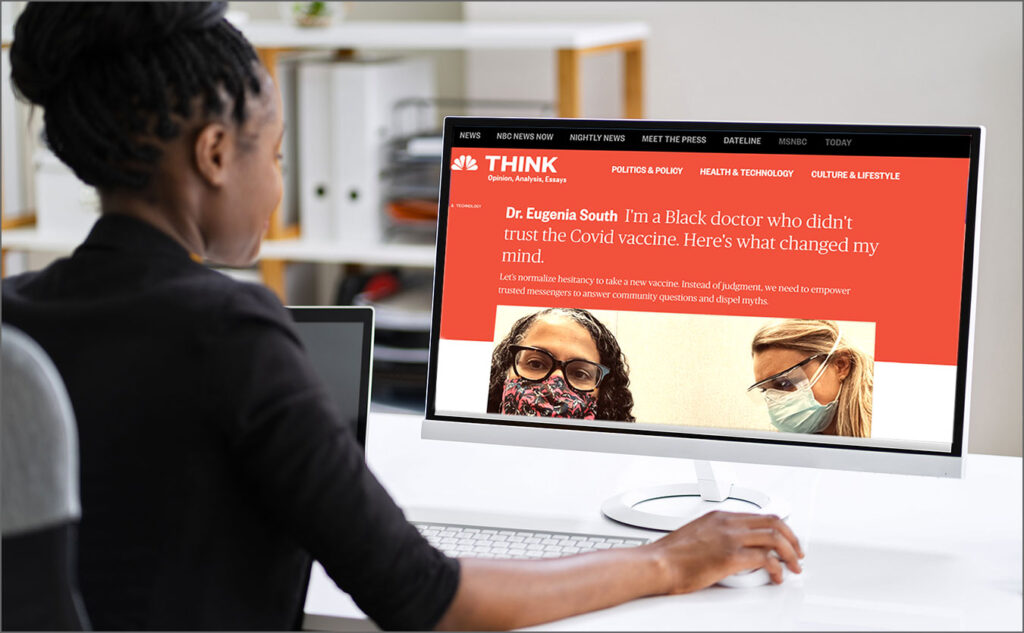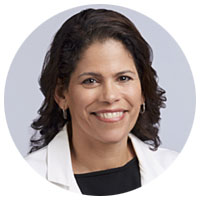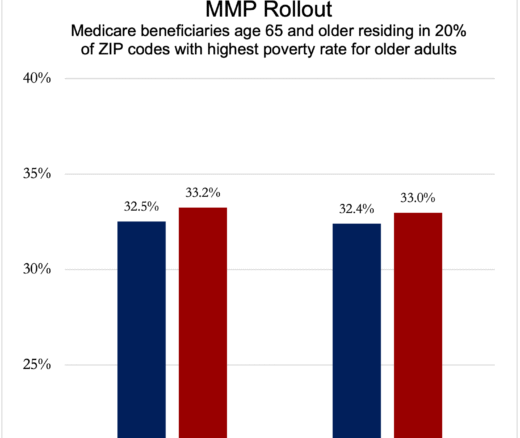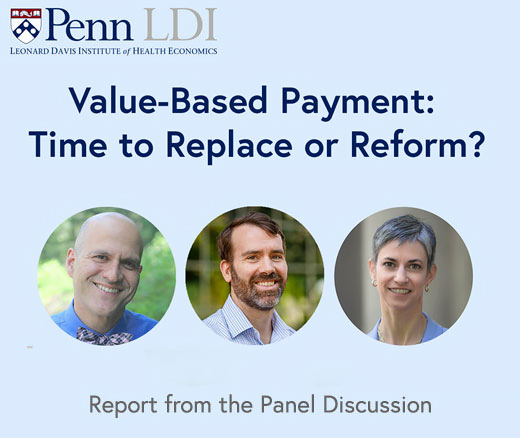
Black Older Adults With Cancer Are Far Less Likely to Get Any Care
New Study From LDI and MD Anderson Finds That Black and Low-Income, Dually Eligible Medicare Patients Are Among the Most Neglected in Cancer Care
News

At a time of continuing calls for U.S. scientists to venture beyond their comfort zone and project their voices and factual authority more aggressively into the nation’s health care policy debates, a rapidly growing number of University of Pennsylvania faculty members have taken up that challenge, particularly health services researchers.
For instance, during the first nine months of 2021, 51 LDI Senior and Associate Fellows were authors or co-authors on 72 op-ed articles in 23 different publications, many of them — like The New York Times, Washington Post, The Hill, and Politico — being among the country’s most influential media outlets.

“We’ve witnessed a disturbing rise in anti-science sentiment and behaviors driven by willful misinformation during the pandemic,” said LDI Executive Director Rachel M. Werner, MD, PhD. “It’s gratifying to see so many LDI Fellows stepping up to meet this challenge. Using the popular media as a platform to disseminate our Fellows’ expertise is a vital part of the political process and the development of rational health policy.”
Werner’s words echo the concerns of many other academic leaders urging faculty members to speak to the public in new and more effective ways. Perhaps the most prominent recent comments on this issue came in an October editorial by Science magazine Editor-in-Chief H. Holden Thorp, PhD.
“The pandemic,” Thorp wrote, “has revealed shocking ineptness by the scientific establishment at conveying messages about masks, vaccination, or the dangers of consuming horse drugs and aquarium cleaners—even in the face of a rising death toll from COVID-19.”
“Since the end of World War II,” continued Thorp, a former Chancellor of the University of North Carolina at Chapel Hill, “scientists have clung to the idea that if they stay objective and state the science, then the rest of the world will follow. As climate change rages and the pandemic cycles on, it’s time to face the fact that this old notion is naïve.”
Not surprisingly, 53 of LDI Fellows’ 72 op-eds focused on some aspect of COVID-19, ranging from the pandemic’s bitter political divide over masking mandates and the psychological impact of remote learning on children, to debates over the use of faulty algorithms, lottery and cash incentives, disadvantage indices, and other various approaches for dealing with vaccine allocation and hesitancy.

Many of the opinion pieces focused on areas in which the pandemic has revealed, or exacerbated health equity issues related to African Americans, Native Americans, Latinx, undocumented immigrants, and other racial and ethnic minorities across the U.S.
One of the most prolific commentary writers during the period, with five pieces in the Washington Post, Los Angeles Times, Philadelphia Inquirer, and NBC News.com, was LDI Senior Fellow and Faculty Director of the Penn Urban Health Lab, Eugenia South, MD, MSHP. Her headlines included “I’m a Black Doctor Who Didn’t Trust the Covid Vaccine. Here’s What Changed My Mind,” “Vaccine Hesitancy is Common Among Black Healthcare Workers. We’re Trying to Resolve It,” and “If Black Lives Really Matter, We Must Invest in Black Neighborhoods.”
“I love writing op-eds and have come to see them as a vital piece of my advocacy work and a critical way to leverage my research agenda and findings to actually change conversation and policy,” said South, who is also an Assistant Professor of Emergency Medicine at the Perelman School of Medicine. “I’ve heard from people and policymakers across the country about the impact of my words. My op-ed in NBC News about my own COVID vaccine journey continues to resonate and people continue to reach out. I’ve heard from countless people that they decided to get the vaccine because of my piece.”

Meredith Rovine, who heads the Vine Public Relations agency that provides op-ed training and support to faculty members at LDI, The Wharton School and the Penn Carey Law School, noted that “the fast-moving news cycle and many of the socioeconomic and political issues we face today, coupled with the impact of the pandemic, has created many opportunities for scientists to place commentary and opinion pieces in mainstream media. Op-ed pieces are a natural way for scientists to engage with the general press as they are able to write on topics aligned with their knowledge, experience and expertise.”
“After an op-ed’s publication,” Rovine continued, “we routinely see the scientists we work with being contacted by other press entities to comment on related issues, as well as by policymakers seeking critical information to potentially evoke or shore up legislation.”

Other LDI Fellow op-eds explored aspects of gun violence, child hunger, long-term care, and how community health workers are successfully being used to promote and facilitate higher levels of vaccinations in underserved communities. Another focus was COVID’s non-obvious impact in areas like maternal health. In a Washington Post commentary, LDI Senior Fellow and Chair of Perelman School’s Department of Obstetrics and Gynecology, Elizabeth Howell, MD, MPP, wrote that 17 months after the outbreak of the pandemic, “death rates for mothers and newborns are soaring to levels not seen in decades, stillbirths have risen sharply and more pregnant and postpartum women are experiencing serious medical complications.”
Another op-ed issue and major paradox of the era has been the continuous media celebration of nurses as “heroes” of the pandemic — even as those nurses have never worked under such deficient conditions for such extended periods at any other time in recent history. Their daily efforts have been widely accompanied by persistent extreme shortages, understaffing and physical and psychological stresses that, according to top researchers, are guaranteed to result in worse health outcomes for both the nurses themselves as well as their patients.
The headline in the August New York Times op-ed authored by Linda Aiken, LDI Senior Fellow and Founding Director of the Center for Health Outcomes and Policy Research at the Penn School of Nursing, was “Nurses Deserve Better. So Do Their Patients.”

Aiken, PhD, RN, FAAN, FRCN, cited working conditions that included “not enough permanent employer-funded positions for nurses in hospitals, nursing homes and schools; the failure of states to enact policies that establish and enforce safe nurse staffing; enable nurses to practice where they are needed, which is often across state borders; and modernize nurse licensing rules so that nurses can use their full education and expertise. Training more nurses cannot solve these problems.”
Aiken is a long-time fan of researcher-authored news commentary: “Op-ed writing is a very worthwhile investment to reach targeted end users of our research in the worlds of health policy, healthcare management, and clinical practice,” she said. “Op-eds in mainstream media outlets and in newspapers in state capitals often get the key takeaways from complex research to those with the power to take action. My recent essay in The New York Times on solutions to the shortage of nursing care during COVID reached a huge audience and resulted in many additional media requests including a feature story for which I appeared on CBS This Morning national TV news.”
“The writing,” Aiken emphasized, “is a different form of communication than we use in science, but it works. Translating research into action is definitely helped by op-eds. So, tenure and promotion committees at Penn need to give faculty ample credit for writing op-eds.”


New Study From LDI and MD Anderson Finds That Black and Low-Income, Dually Eligible Medicare Patients Are Among the Most Neglected in Cancer Care

Her Transitional Care Model Shows How Nurse-Led Care Can Keep Older Adults Out of the Hospital and Change Care Worldwide

Chart of the Day: Medicare-Medicaid Plans—Created to Streamline Care for Dually Eligible Individuals—Failed to Increase Medicaid Participation in High-Poverty Communities

Penn LDI Debates the Pros and Cons of Payment Reform

Direct-to-Consumer Alzheimer’s Tests Risk False Positives, Privacy Breaches, and Discrimination, LDI Fellow Warns, While Lacking Strong Accuracy and Much More

One of the Authors, Penn’s Kevin B. Johnson, Explains the Principles It Sets Out

Six Lessons the U.S. Can Learn from Europe About Protecting Health Data Linkages

Testimony: Delivered to Philadelphia City Council’s Committee on Labor and Civil Service